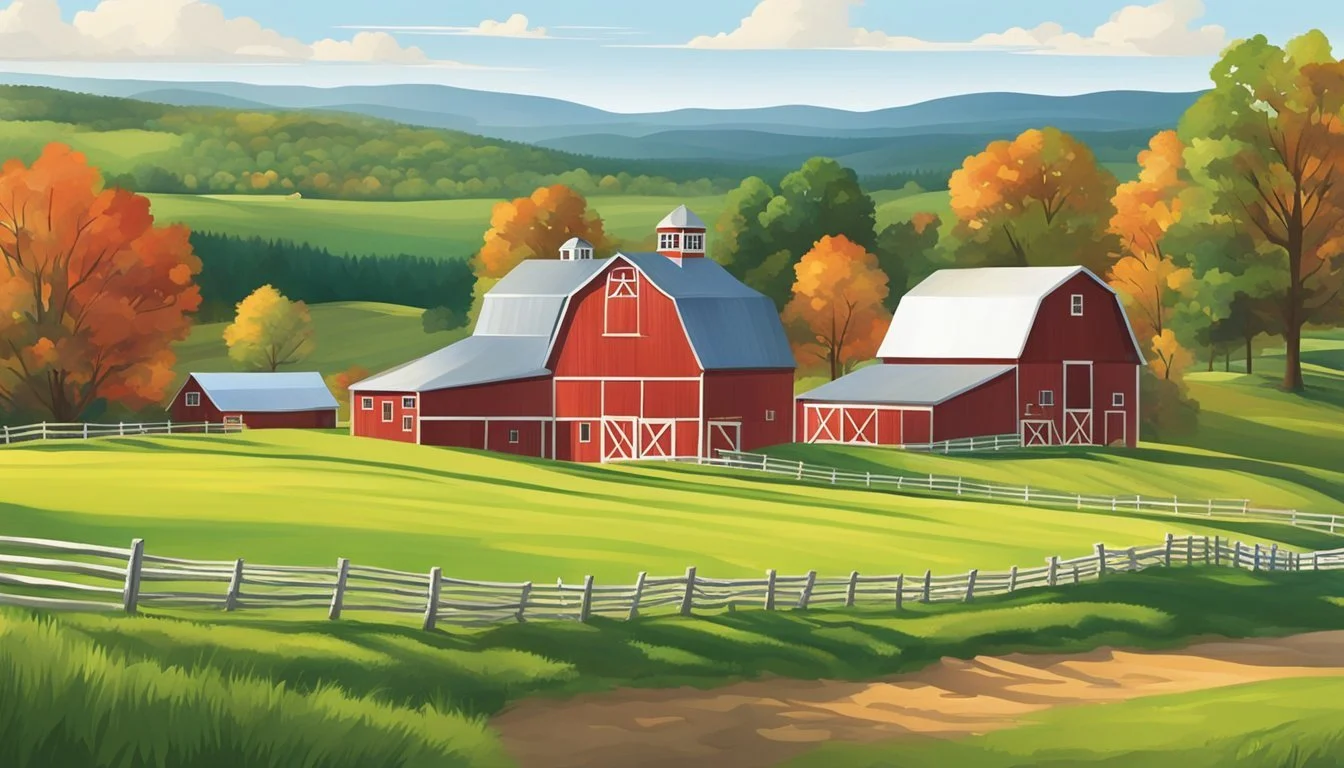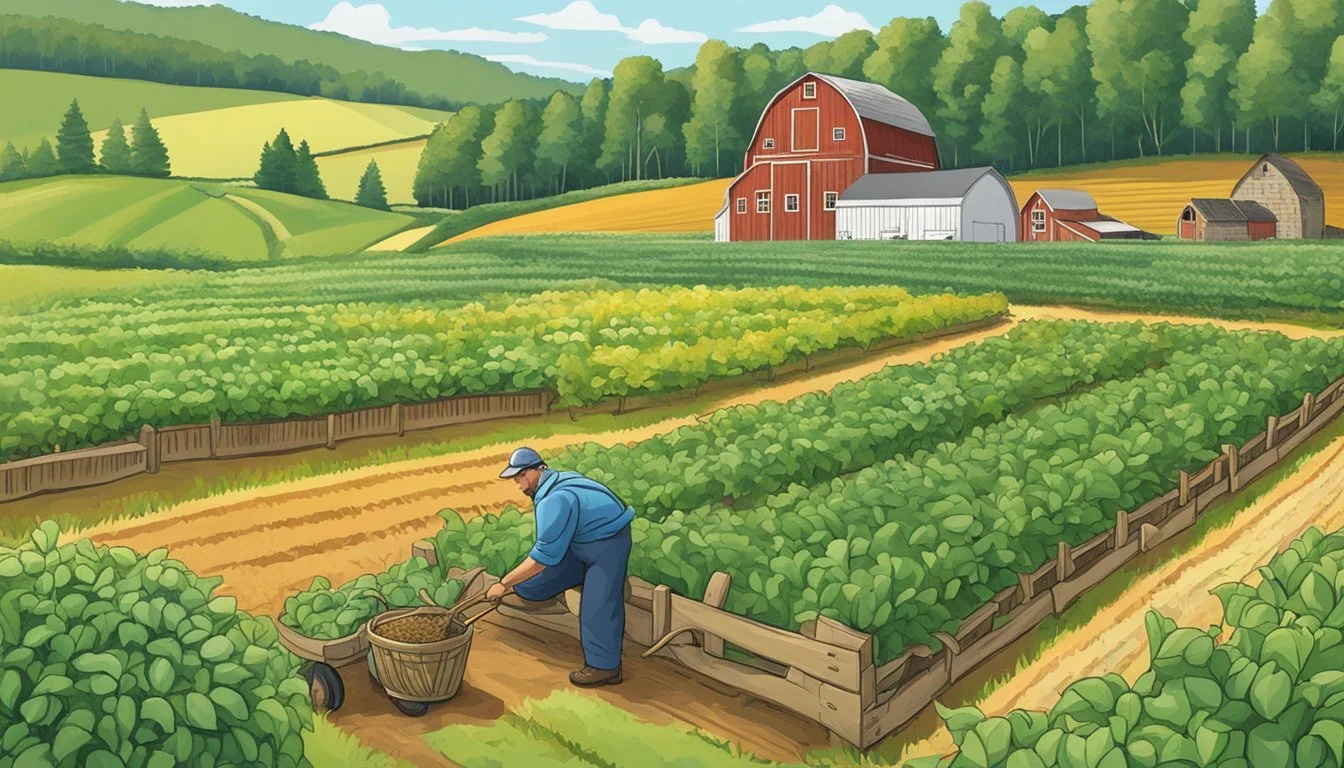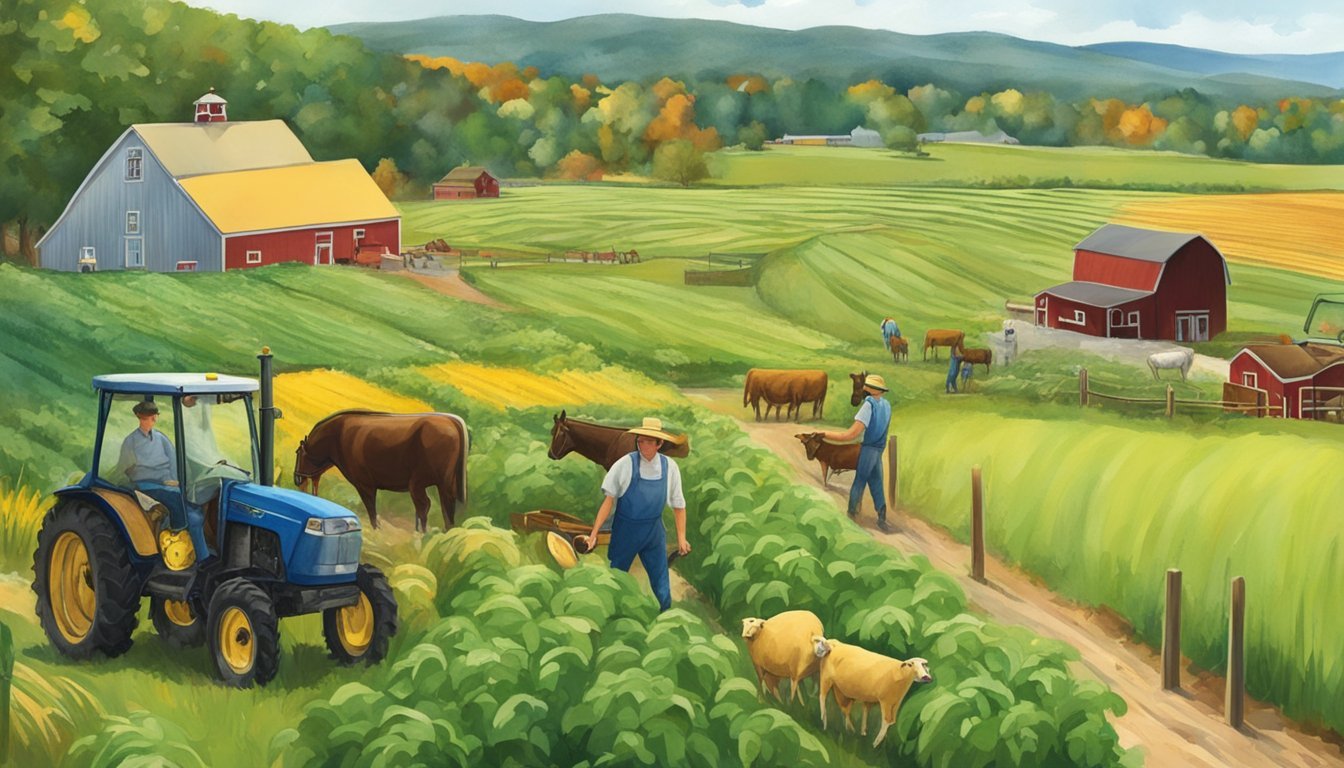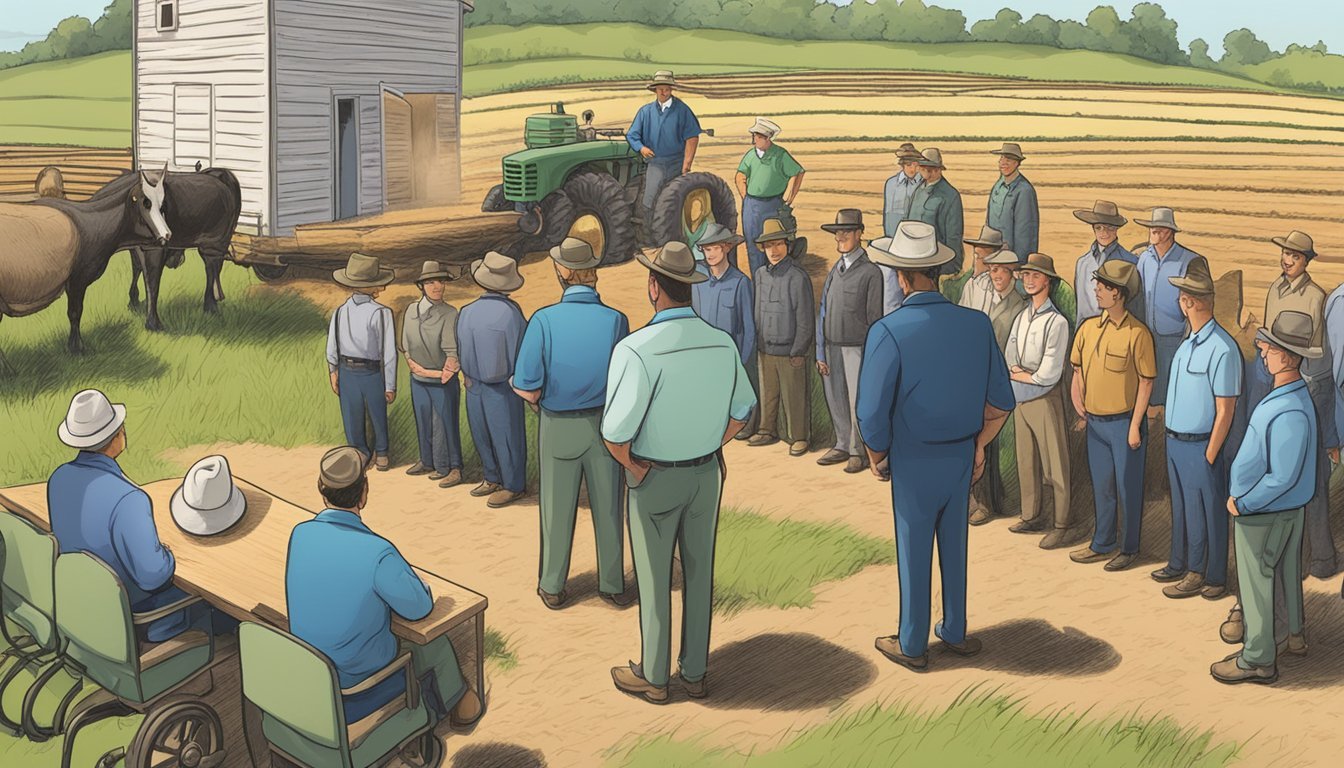Right to Farm Law in New Hampshire
Understanding Agricultural Protections
The Right to Farm Law in New Hampshire is a significant piece of legislation that offers protection to agricultural operations within the state. Grounded in RSA 21:34-A, the law safeguards farmers from both public nuisance suits, typically brought by the government, and private nuisance suits, which may be initiated by individuals such as neighbors. It aims to maintain the viability of farming and the rural character of New Hampshire by ensuring that changes in local conditions do not unjustly harm agricultural operations.
My Latest Videos
Under this law, a set of conditions must be met for the protections to apply. The statute acknowledges the importance of agricultural activities to the state's economy and heritage and seeks to balance the rights of farmers with those of their surrounding communities. By doing so, New Hampshire's Right to Farm Law helps to create a stable legal environment where agriculture can thrive alongside urban development.
As the importance of agriculture persists in the face of expanding development, the law provides a necessary shield for farmers who adhere to accepted practices and who were operating before any conflict arose. It concisely addresses rural land use concerns while encouraging sustainable farming practices, which are invaluable to New Hampshire's economy and way of life.
Historic Overview of Right to Farm Laws
Right to Farm laws have evolved significantly over time to protect farmers from nuisance lawsuits and to promote agricultural activity. New Hampshire, like many states, has established statutes to uphold these protections, while adapting to changes in the agricultural landscape.
Early Developments in Farm Protections
In the early stages of Right to Farm law development, the primary focus was to shield farmers from the encroachment of suburban and urban expansion. The rise of urban sprawl in the 1970s prompted a need to protect pre-existing farms from the influx of new residents unfamiliar with the typical operations and impacts of agricultural activities. This era marked the onset of formal legal protections for farming operations.
Evolution of Statutory Frameworks
The legal landscape began to take more shape with a series of legislative efforts:
1961: This year marked an early acknowledgment of agricultural protection needs, setting a precedent for future legislative developments.
1977-1979: These years were critical in establishing a more robust statutory framework to support agricultural activities.
1985: Further milestones were achieved as lawmakers expanded on existing protections, recognizing the ongoing challenges faced by farmers.
1997-1999: A significant period of refinement, during which states evaluated the effectiveness of the Right to Farm laws and sought to strengthen them in accordance with contemporary farming realities.
2005-2008: This period saw additional adjustments to the statutes, often in response to changes in the agricultural sector and pressures from non-farming developments.
2016: The most recent changes were made, indicating the laws’ continual adaptation to the needs of the agricultural community and the changing environment around it.
Recent Amendments and Changes
New Hampshire's Right to Farm laws have seen amendments that reflect a more nuanced understanding of both agricultural and non-agricultural interests:
2005: Amendments began to clarify the extent of the protections offered to farmers.
2006: Adjustments were made to address the balance between farming practices and local regulations.
2007-2008: Further changes were introduced to ensure the laws remained relevant to contemporary agricultural practices and to bolster protections against nuisance complaints.
2014: New Hampshire reviewed its statutes to ensure ongoing viability and fair application.
2016: The most recent evolution of the law, confirming the state's commitment to maintaining a viable agricultural sector amid the complexities of modern land use dynamics.
New Hampshire's approach to Right to Farm has generally been consistent with national trends, emphasizing the need to protect legitimate farming activities while balancing the rights of rural, suburban, and urban residents.
Defining the Right to Farm
Right to Farm laws are designed to protect agricultural operations from nuisance lawsuits while supporting their vital role in the local food system and economy.
Core Principles of Right to Farm Laws
Right to Farm laws establish a baseline of protection for farms and agricultural operations against private nuisance claims. The intent is to allow agricultural entities to operate without the undue threat of legal challenges that might arise from normal farming activities possibly deemed a nuisance by non-farming residents.
RSA 21:34-A Explanation
In New Hampshire, RSA 21:34-a plays a key role in defining what constitutes an agricultural operation. This statute outlines the activities and businesses included within the scope of the term "farm," thus determining who can seek protection under Right to Farm laws.
Key Terms and Definitions
Farm: Area designated for agricultural activities such as cultivation of land or raising of livestock.
Agricultural Operation: Engagements in farming and related activities, protected under RSA 432:32.
Agriculture: The active use of land for growing crops or raising livestock.
Private Nuisance: Interference with an individual's enjoyment and use of their land.
Nuisance Liability of Agricultural Operations: The specific clause under RSA 432:33 ensuring immunity from suit for farming activities classified as lawful.
Right-to-Farm Law: Legislation aimed at protecting farms and agricultural operations from nuisance claims.
Legal Protections and Liabilities
Within the state of New Hampshire, distinctive legal frameworks are established to safeguard agricultural practices. Key protections are derived from statutes aimed at mitigating the friction between farming operations and non-farming residents or entities that may raise nuisance claims. These protections, coupled with specific liabilities and immunities, cement the legal landscape that farmers need to navigate.
Nuisance Suits and Agricultural Operations
New Hampshire's Right-to-Farm (RTF) law serves as a defense mechanism for agricultural operations facing nuisance suits. This umbrella of protection extends both to suits brought by individuals such as neighbors (private nuisance) and those filed by the government on behalf of the public. To benefit from RTF law defenses, operations must meet certain conditions set forth by state legislation. Significantly, long-standing farms are often granted immunity from nuisance suits especially when complaints stem from changes in local conditions after the farm was established.
Immunity from Liability
The legal principle of immunity from liability under New Hampshire law is pivotal for farmers. This immunity applies when the farm complies with existing regulations and operates within common law parameters. Statutes provide that agricultural practices that are not outright negligent or do not constitute a trespass will generally not result in liability. As such, the statutory framework bolsters a farm's defense against potential legal challenges, provided that the farm's activities fall within the guidelines of what is considered standard agricultural operation.
RSA 432: Soil Conservation and Farmland Preservation
Under RSA 432: Sections 32 to 35, New Hampshire enacts specific statutes focusing on soil conservation and farmland preservation. This legislation underscores the state's commitment to sustainable agricultural practices and protection of farmland. The law provides for measures aimed at conserving soil, water resources, and related land for farming, thereby playing a critical role in supporting the state's agricultural economy. The statutes within RSA 432 assist in shielding farmers from overreach, aligning with the RTF law to promote a robust and legally secure environment for agriculture.
Land Use and Environmental Management
The Right to Farm Law in New Hampshire is closely tied to land use policies and environmental management practices that support agricultural activities. This includes careful planning and zoning to protect farmland, as well as the adoption of conservation strategies to sustain the land's productivity and environmental quality.
Zoning and Planning for Agricultural Land
The State of New Hampshire recognizes the importance of farmland and has enacted zoning policies to safeguard agricultural spaces. Local planning boards, in conjunction with the Department of Agriculture, Markets & Food, work to ensure that zoning regulations support the needs of farmers and the agricultural sector:
Agricultural Commissions: Developed to advise and advocate for local farming interests and the preservation of agricultural land.
Soil Conservation and Farmland Preservation: Programs and incentives are designed to protect valuable soil resources and prevent the conversion of farmland to non-agricultural uses.
Permits and Structures: Regulations that facilitate the erection of agricultural structures, such as barns and greenhouses, essential for farm operation, while also considering environmental impacts.
Farmers may be required to navigate specific planning and zoning requirements to establish and maintain their operations legally, which sometimes includes acquiring special permits related to land use.
Conservation and Sustainability Practices
Farmers in New Hampshire are encouraged to employ conservation and sustainability practices to protect the environment, including the land and water resources upon which agriculture depends:
Compost and Manure Management: Regulations govern the use and disposal of organic waste to enhance soil quality while preventing contamination.
Livestock and Forestry Management: Best practices are promoted for raising animals and managing woodlands to maintain ecological balance.
Agritourism and Diversification: Supporting agritourism and crop diversification helps sustain farm income and land use while minimizing environmental stress.
The Department of Agriculture, Markets & Food provides resources and educational programs aimed at aiding farmers with the implementation of sustainable practices such as proper fertilizer and seed usage, in addition to promoting soil conservation techniques.
Farm Operations and Public Interactions
The intersection between New Hampshire farm operations and public interactions is marked by the influence on local economies and the growing interest in agritourism. These interactions shape the Granite State's farm to plate food policy and emphasize the sustainability of local markets.
Impact on Local Communities and Markets
New Hampshire farm operations contribute significantly to local communities by providing fresh produce to markets and food sectors. Commercial activities facilitate the connection between agricultural producers and the retail market, directly affecting local economies. Robust management practices are crucial for farmers to meet both public health standards and market demands. The state’s Right to Farm Law not only supports farmers in maintaining sustainable operations but also reinforces the state's commitment to protecting agricultural interests as they adapt to evolving market conditions.
Farm to Plate Initiatives: These highlight the importance of sustainable food systems and impact on the state's economy.
Weights and Measures: Adequate regulation ensures fair trade practices within the state’s markets.
Agricultural Tourism and Education
Agritourism in New Hampshire is a growing sector, allowing the public to engage with farm operations through educational and recreational activities. This interaction fosters a bridge between producers and consumers, promotes the Granite State farm to plate food policy, and supports agricultural education. Farmers employ effective management practices to ensure that agritourism activities are safe and educational, which in turn enhances the public's understanding of agricultural production. Transparency in operations is underpinned by guidelines such as those found in the "Legal Guide for New Hampshire Agricultural Producers."
Agritourism Activities: Include farm tours, crop mazes, and harvest festivals which offer immersive experiences.
Educational Outreach: Programs aimed at schools and community groups that share knowledge on agriculture and food production.
New Hampshire agricultural producers continue to adapt to the integration of community interests and commercial viability, reflecting a balanced approach between farm operations and public engagement.
Agricultural Practices and Animal Husbandry
In New Hampshire, the Right to Farm laws provide a framework that supports agricultural practices and animal husbandry, ensuring that as long as farmers meet certain conditions, their operations are protected. This includes the management of various animal species, from traditional livestock to aquaculture, as well as the adoption of alternative farming ventures that diversify farm income.
Livestock and Poultry Management
New Hampshire farmers employ a range of management practices for livestock and poultry, focusing on the health and welfare of animals such as swine, poultry, equines, and other fur-bearing animals. Optimal feeding practices and maintaining appropriate weights are essential to animal husbandry. The state’s regulations permit the use of garbage as feed for swine under strict conditions to prevent disease. In the production of poultry and eggs, farms adhere to standards that ensure the safety and cleanliness of New Hampshire's food supply.
Swine: Highlight the necessity for proper feeding practices and biosecurity measures.
Poultry: Emphasize on proper living conditions, feed quality, and disease management.
Alternative Farming Ventures
The exploration of alternative farming ventures in New Hampshire involves activities such as aquaculture, the cultivation of nursery stock, and the production of maple syrup and honey. These practices are part of a broader definition of agriculture, which extends beyond traditional field crops to innovative and sustainable ways of food production and farm income enhancement.
Aquaculture: Outline the rigorous standards for water quality and animal health.
Maple Syrup: Discuss the practices around sap collection and syrup processing.
Honey Crops: Mention the importance of beekeeping for pollination and honey production.
Farmers engaged in these ventures strive for diversification, which bolsters the agricultural economy and provides resilience against market fluctuations. The Right to Farm laws in New Hampshire protect these varied agricultural operations, acknowledging their significance in the state’s economy and heritage.
State and Federal Interaction
In New Hampshire, state Right to Farm laws interact with federal regulations to protect agricultural operations while ensuring compliance with broader policies regarding safety, transportation, and public water supplies.
Role of the Department of Agriculture
The New Hampshire Department of Agriculture plays a pivotal role in enforcing state-level Right to Farm statutes. They ensure that farms operate within the guidelines that aim to preserve farmland and encourage agricultural activities. Specifically, the department oversees the current use tax rate which provides financial relief to farms, reinforcing their sustainability and longevity within the state. The department collaborates with municipal entities to prevent conflicts between farms and non-agricultural land use, upholding the principles of the Right to Farm law.
US Department of Agriculture Regulations
On the federal level, the United States Department of Agriculture (USDA) introduces and enforces regulations that span across safety protocols, transportation of goods, and protection of plant species. These regulations are designed to complement state-level laws while focusing on the broader impacts of agriculture across state lines and the nation. For instance, the USDA sets federal standards for safe transportation practices, which must be adhered to by New Hampshire farmers to ensure that products are safely delivered to markets. The USDA also contributes to the welfare of public water supplies by establishing guidelines that prevent agricultural pollution, which farms in New Hampshire must follow while exercising their rights under the Right to Farm law.
Resources for Farmers and Legal Professionals
Farmers and legal professionals in New Hampshire can access a wealth of resources tailored to the agricultural community. This collection of educational materials and legal documents provides critical insights into the state’s Right to Farm Law, ensuring that practitioners remain current with guidelines and best practices.
Educational Materials from University of New Hampshire
The University of New Hampshire (UNH) offers a robust array of materials designed to assist farmers with legal questions and agricultural practices. Stakeholders can benefit from UNH's:
Workshops and webinars targeting current agricultural laws
Publications on sustainable farming methods and legal compliance
Legal Guides and Reference Documents
A definitive Legal Guide for New Hampshire Agricultural Producers serves as an essential handbook, covering topics such as land use, taxes, and liability. Key elements of this guide include:
Practical advice for compliance with state and federal regulations
Resource lists and legal research tools specific to the agricultural sector
Legal professionals and farmers alike can rely on this guide for detailed explanations of New Hampshire’s agricultural laws and for navigating the complexities of Right to Farm regulations.
Recent Legal Cases and Precedents
The legal landscape in New Hampshire regarding right to farm laws includes several notable court cases that establish important precedents. These cases shed light on how the legislation is interpreted and enforced, impacting the agricultural community.
Influential New Hampshire Farming Cases
New Hampshire's approach to farm protection under the right to farm laws has been shaped by state court decisions. A recent case that holds significance is State of New Hampshire v. Robert A. Graham, Jr., where issues resembling those faced in Jaskolka were used to reference the judicial process for motions to vacate convictions and granting new trials. This underscores the fact that agricultural laws may sometimes intersect with other areas of the legal system beyond their immediate purview.
National Cases Affecting Local Practices
Beyond the state's borders, national cases also influence New Hampshire's agricultural practices and legal interpretations. Decisions made at the federal level around farming operations and the environment set precedents that local courts and regulators consider when confronting agricultural issues. For instance, environmental protection statutes and water quality laws can influence the state's farming regulations. Secondary sources, such as legal research and analyses, supplement the understanding of these national cases and assist in applying common law principles locally.










